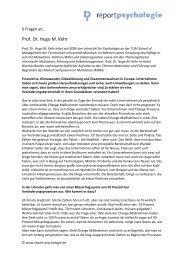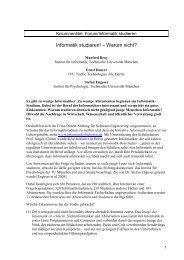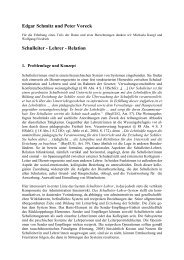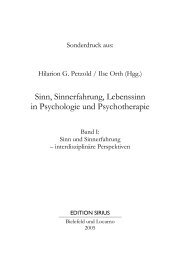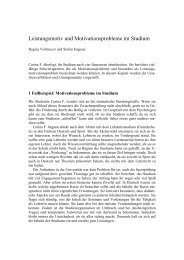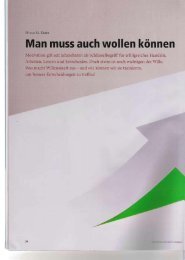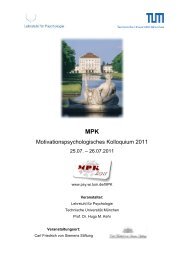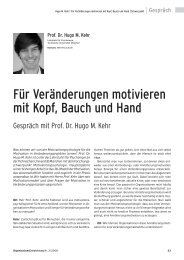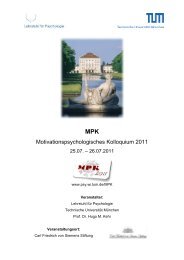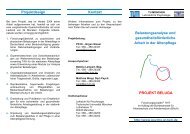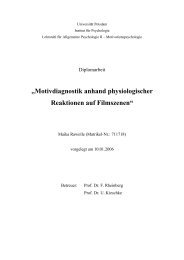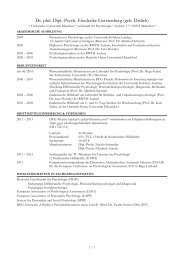Running head: Incentives and flow-experience in learning settings ...
Running head: Incentives and flow-experience in learning settings ...
Running head: Incentives and flow-experience in learning settings ...
- No tags were found...
Create successful ePaper yourself
Turn your PDF publications into a flip-book with our unique Google optimized e-Paper software.
sett<strong>in</strong>gs these results mean that <strong>in</strong> order to evoke <strong>flow</strong> <strong>experience</strong> <strong>in</strong> students, eitherthe challenge-skill balance can be adapted to students motive or the motives can bechanged <strong>in</strong> that way that they fit with the challenge-skill balance condition. It isimportant to note that both ways are just theoretical speculations unless empiricalevidence for their efficacy is supplied, but nevertheless they might <strong>in</strong>spire a new viewon educational sett<strong>in</strong>gs.Adapt<strong>in</strong>g the challenge-skill balance condition to a person’s motive would bea new strategy that has not been used so far with<strong>in</strong> the achievement motivationresearch. With this strategy it would be possible to motivate students. Facilitat<strong>in</strong>g<strong>flow</strong> <strong>experience</strong> <strong>in</strong> students with fear of failure is a desirable pedagogical aim but, onthe other h<strong>and</strong>, provid<strong>in</strong>g a student with too easy or too difficult tasks (which areoptimally <strong>flow</strong>-aris<strong>in</strong>g for students with fear of failure) is <strong>in</strong> conflict with the <strong>in</strong>creaseof competences <strong>and</strong> knowledge. The <strong>in</strong>crease of competence <strong>and</strong> knowledge dependson realistic dem<strong>and</strong>s that are not given for <strong>in</strong>dividuals <strong>in</strong> a challenge-skill imbalancesituation. Therefore, <strong>in</strong> the long run, it makes much more sense to make a student feelcomfortable with challenge-skill balanced tasks. This second implication requiresmodify<strong>in</strong>g a students’ motive <strong>in</strong> a way that it <strong>in</strong>teracts optimally with challenge-skillbalance.Chang<strong>in</strong>g motives is a complex procedure, because motives are conceptualizedas characteristics, which, once they are developed, are relatively stable across the lifespan <strong>and</strong> that are difficult to <strong>in</strong>fluence by the social environment (McClell<strong>and</strong>, 1985).Nevertheless, sophisticated <strong>in</strong>tervention programs showed that it is still possible tochange motives to some degree. Intervention programs that have been proven to behighly effective mostly reduce fear of failure (rather than enhance hope of success);for example by tra<strong>in</strong><strong>in</strong>g realistic goal sett<strong>in</strong>g <strong>and</strong> teach<strong>in</strong>g beneficial attributions forsuccess <strong>and</strong> failure (Krug & Hanel, 1976; for an overview see Rhe<strong>in</strong>berg & Engeser,<strong>in</strong> press; Rhe<strong>in</strong>berg & Krug, 2005). With effective motive modification programs,fear of failure with its negative consequences (e.g., the negative consequences on <strong>flow</strong><strong>experience</strong> <strong>in</strong> case of a challenge-skill balance situation) can be reduced so that aga<strong>in</strong>the development of students’ skills <strong>and</strong> well-be<strong>in</strong>g are enhanced.Consider<strong>in</strong>g the <strong>in</strong>strumentality of a task as a moderator with<strong>in</strong> the challengeskillbalance <strong>and</strong> <strong>flow</strong> relationship could also have <strong>in</strong>terest<strong>in</strong>g practical implications.Regard<strong>in</strong>g Engeser <strong>and</strong> Rhe<strong>in</strong>berg’s (2008) results, challenge-skill balance is optimalto <strong>experience</strong> <strong>flow</strong> <strong>in</strong> activities of low <strong>in</strong>strumentality, whereas for high<strong>in</strong>strumentality tasks the skill should be higher than the challenge of the task.Transferred to teach<strong>in</strong>g practice, it would be best to challenge students with skillfitt<strong>in</strong>gtasks that are not evaluated by the teacher, do not <strong>in</strong>fluence a grade <strong>and</strong> do nothave other important consequences (= low <strong>in</strong>strumentality). For example, such a taskcould be learn<strong>in</strong>g a new topic without be<strong>in</strong>g directed towards an important purposesuch as an exam<strong>in</strong>ation or solv<strong>in</strong>g complex math problems that are not evaluated. Thiscan evoke <strong>flow</strong> <strong>experience</strong> <strong>and</strong> thus learn<strong>in</strong>g motivation <strong>and</strong> performance can beenhanced <strong>and</strong> will help to improve students’ competences. To deal with the fact thatgrades <strong>and</strong> evaluations are part of most pedagogical school systems, teachers couldlower the task challenges when tasks have a high <strong>in</strong>strumentality such as a statisticstest or other k<strong>in</strong>ds of exam<strong>in</strong>ations. This could be done, for example, by lett<strong>in</strong>gstudents practice already well h<strong>and</strong>led operations (e.g., rout<strong>in</strong>e tasks) dur<strong>in</strong>g thepreparation for an exam<strong>in</strong>ation. With this procedure, <strong>flow</strong> can be ma<strong>in</strong>ta<strong>in</strong>ed even <strong>in</strong>necessary exam preparation periods. Additionally, the students can perform on a highlevel due to high competences they achieved by low <strong>in</strong>strumentality tasks they15



